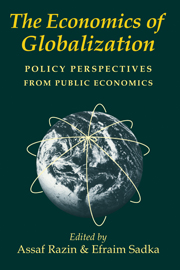Book contents
- Frontmatter
- Contents
- Preface
- List of Contributors
- Introduction
- I International Mobility of Technology
- II Capital Flows and Exchange-Rate Misalignment
- III Tax Incentives and Patterns of Capital Flows
- IV Limits to Income Redistribution in Federal Systems
- V Tax Harmonization, Tax Coordination, and the “Disappearing Taxpayer”
- VI Political-Economy Aspects of International Tax Competition
- VII Migration of Skilled and Unskilled Labor
- VIII Fiscal Aspects of Monetary Unification
- Index
Introduction
Published online by Cambridge University Press: 28 January 2010
- Frontmatter
- Contents
- Preface
- List of Contributors
- Introduction
- I International Mobility of Technology
- II Capital Flows and Exchange-Rate Misalignment
- III Tax Incentives and Patterns of Capital Flows
- IV Limits to Income Redistribution in Federal Systems
- V Tax Harmonization, Tax Coordination, and the “Disappearing Taxpayer”
- VI Political-Economy Aspects of International Tax Competition
- VII Migration of Skilled and Unskilled Labor
- VIII Fiscal Aspects of Monetary Unification
- Index
Summary
The past two decades have witnessed a growing trend toward economic openness. The fading of borders between independent economic systems - local, state, national, and otherwise - has had immense implications for economic policies in each of these systems. Capital, firms, and labor are now able to move more freely across regions, states, and countries and can better exploit differences in opportunities (employment, savings, investment, etc.) and in technological and economic environments, as well as in fiscal and monetary stances. For instance, the tax base has increasingly become more global, and its allocation among the various tax jurisdictions more responsive to the tax policies in each of these jurisdictions. As succinctly put by The Economist (May 31,1997):
Globalisation is a tax problem for three reasons. First, firms have more freedom over where to locate. … This will make it harder for a country to tax [a business] much more heavily than its competitors. … Second, globalisation makes it hard to decide where a company should pay tax, regardless of where it is based. … This gives them [the companies] plenty of scope to reduce tax bills by shifting operations around or by crafty transfer-pricing. … [Third], globalisation … nibbles away at the edges of taxes on individuals. It is harder to tax personal income because skilled professional workers are more mobile than they were two decades ago. [pp. 17-18]
Similarly, capital can move from regions where its return is low and labor costs are high to regions where its return is high and labor costs are low.
- Type
- Chapter
- Information
- The Economics of GlobalizationPolicy Perspectives from Public Economics, pp. 1 - 14Publisher: Cambridge University PressPrint publication year: 1999

